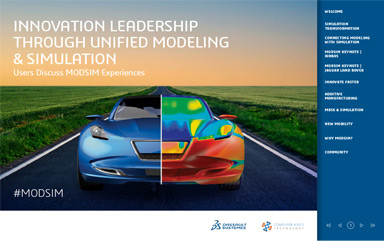Editor’s Pick: New Machine Learning and Data Intelligence Support for Engineering Simulation
Autonomous optimization helps simplify complex engineering processes.

The Spring 2019 Update to ESTECO VOLTA includes a set of new template charts to help simplify the search for more optimal designs. Image courtesy of ESTECO.
Latest in Design Exploration and Optimization
Latest Resources

Latest Resources

Design Exploration and Optimization Resources

Latest News
March 13, 2019
Dear DE Reader:
Simulation data can be like late winter snow: it keeps piling up, but nobody knows what to do with it. Companies using ESTECO VOLTA simulation process automation software don’t have this problem. Our Editor’s Pick of the Week is the Spring 2019 update of ESTECO VOLTA, which takes simulation process optimization to another level. The update offers new support for machine learning and new routines to support simulation process automation.
If you aren’t familiar, VOLTA is a platform for multidisciplinary business process automation and simulation data management. It simplifies processing and (re)using the vast trove of engineering knowledge generated by simulation. ESTECO calls it “Optimization Driven Design” because it runs all the time in the background, autonomously looking for patterns and best results buried within simulation data. Think of it as a Roomba for simulation data, one that runs on cloud services, HPC clusters or even single workstations. VOLTA also includes ESTECO’s original simulation process management software modeFRONTIER, drawing on the company’s long history of simulation process innovation.
Artificial intelligence (AI) is a big theme in engineering circles. Those AI algorithms need a ton of data to generate useful deep learning or machine learning processes. VOLTA not only organizes simulation data for AI processes, but it does so in the background as your team works. ESTECO calls it autonomous optimization; it means you can concurrently compare, validate and choose design solutions in sync with other tasks, and not as a separate later event. The alternative to autonomous optimization is good old manual trial and error. Running and examining one simulation at a time when you could be comparing many is time-consuming and costly.
Another way VOLTA improves simulation workflow is with a fancy AI approach to data analysis called Response Surface Modeling (RSM). Complex simulations are condensed into surrogate models (also known as meta-models or approximation models) for faster analysis. The RSM training interface has been updated with a step indicator. It tracks the algorithm’s progress, allowing an engineer to more quickly uncover and exploit best practices for predictive model training. The new RSM training interface also makes it easier to reduce redundant results and more efficiently fine-tune the training configuration.
VOLTA is a tool for engineering data intelligence; you must design data analysis processes before harvesting results to optimize designs. To simplify this, VOLTA includes a library of charts that work like templates to streamline data engineering processes. Check out the six additional charts in the Spring update.
The Spring 2019 update of VOLTA also extends the theme of applied high-performance computing in the service of simulation data management. It is a three-legged stool: capture engineering knowledge, create and use data intelligence tools and securely manage distributed processing with high security.
That's just the tip of the snowdrift when it comes to the Spring 2019 VOLTA update. Read more about it here to see how it integrates with other modules in the ESTECO platform and assists with Design of Experiments.
–DE Editors
More ESTECO Coverage
Subscribe to our FREE magazine, FREE email newsletters or both!
Latest News
About the Author
DE’s editors contribute news and new product announcements to Digital Engineering.
Press releases may be sent to them via DE-Editors@digitaleng.news.




